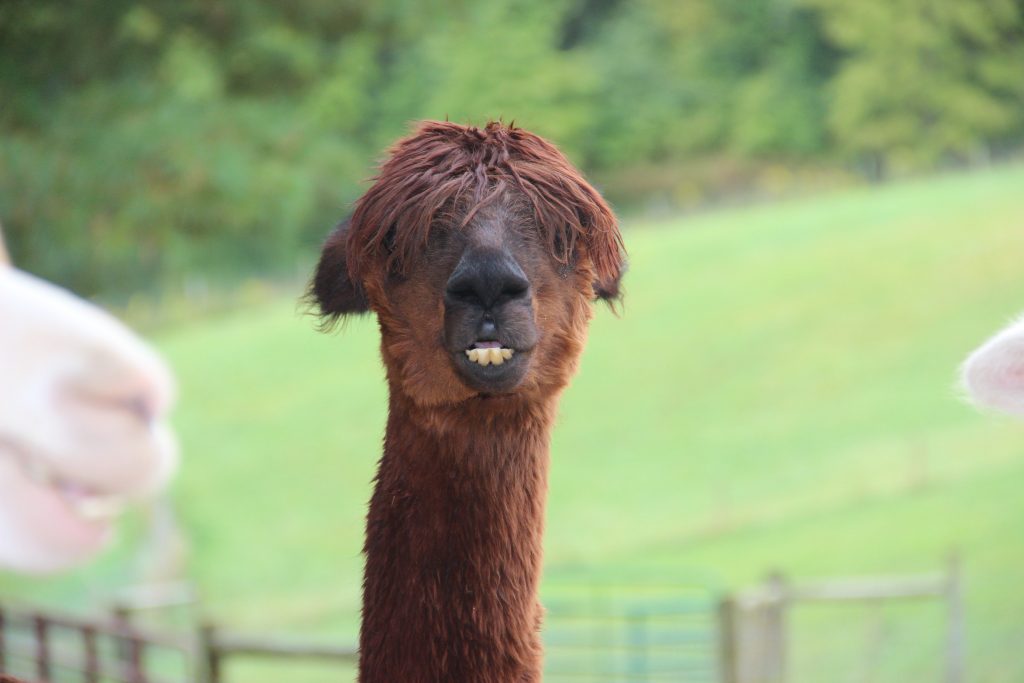As Albert Camma walks his farm, he has time to reflect on the endeavor he’s been working on for over a decade.
“We’ve always felt the animals share our home just like we do,” Albert says. “They’re just cool animals.”
The story of the farm began in 2008, when Albert and his wife, Rebecca, decided to get a herd of 15 alpacas after a trip to a farm in North Carolina. They now have over 100 alpacas on their 180-acre farm.
Alpacas are fluffy, with perky ears and unique, messy haircuts. They are scattered across four barns on the secluded property, which is surrounded by hills. Upon arrival, visitors buzz in through the gate adorned with the farm’s logo, the outline of the head and neck of an alpaca.
Lindsey Warne is the chief marketing officer for the farm, and she has worked there for over five years. She says Rebecca’s passion for the animals was akin to love at first sight.
“She saw the alpaca getting born [(at the farm in 2008),] they knew they wanted to do something with their property,” Warne says. “It just kind of snowballed from there.”
Over the years, Rebecca and Albert have bred numerous alpacas. The alpacas come in all different colors and sizes—there are over 22 recognized colors for alpacas––, with features ranging from bulging eyes to perky, spear-shaped ears.
The farm owns mostly Suri alpacas, which are much rarer than the Huacaya alpaca, and are known for the luster and durability of their coats.
The fiber the alpacas produce is worth about $100 for a ball of yarn, depending on the animal. The farm has some of the highest quality fiber in the country, and processing these products usually takes months.
Rebecca names the alpacas. The naming process is relatively simple, as she tries to match a child’s name to have the same first letter as either it is mother or father. Sometimes, however, she gets more creative, naming some alpacas––like the Harry Potter-inspired Bellatrix Lestrange––after fictional characters.
One of the younger alpacas, Ella, still lives in the maternity ward, where the farm keeps pregnant alpacas or ones that recently gave birth. Pregnancies typically last between 11 and–12 months for the animals. Alpacas have strong bonds with their mothers and are very family-oriented animals.
The alpacas are kept in multiple barns.; For example, males and females are separated to avoid unwanted breeding. The barns are littered with fans because—alpacas have heavy fleece and hot Ohio summers are not their natural habitat.

The newest barn was built in 2018, made for older alpacas around ages 13 or 14 that can no longer breed. A typical alpaca lifespan is 15-20 years, with the oldest on the farm, Nightingale, being 18 years old. The barn also has extra cameras to monitor the older alpacas.
The alpacas aren’t the only appeal of the farm. The property also has a bed- and- breakfast with four rooms and a garden. The Alpacas of Spring Acres had to close due to the pandemic, but it reopened in May of 2021. Now guests can explore other parts of the grandiose property, such as the 5-acre lake visible from the alpaca barns.
Tours, which are scheduled by appointment and cost $10 per person, allow visitors to feed alpacas and experience the barns first-hand. Find an alpaca you develop a connection with? While it’s probably not for sale, there is a good chance that products in the farm’s store contain fiber from that particular animal.
Albert and Rebecca had plans to build a new barn, but this was put on hold by the pandemic.
“([Rebecca)] wanted to be a source to rescue these animals and then give them out to people who would take care of the animals who maybe couldn’t afford it,” Albert says.
While some dreams are on pause, Albert is satisfied that he has achieved his goal of raising awareness on alpacas.
“I guess that’s what our goal was, to get a great place for all animals, two-legged and four-legged.”